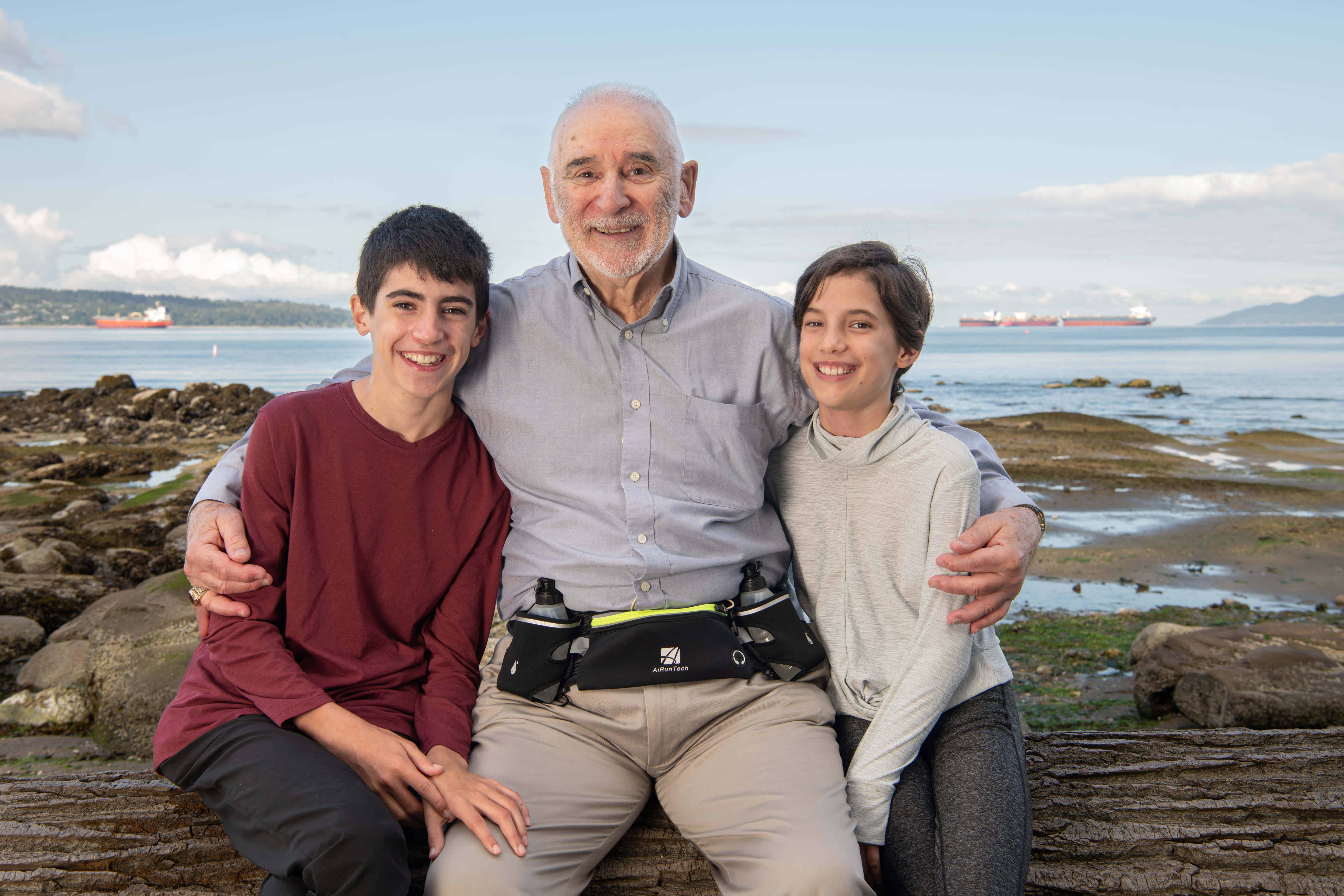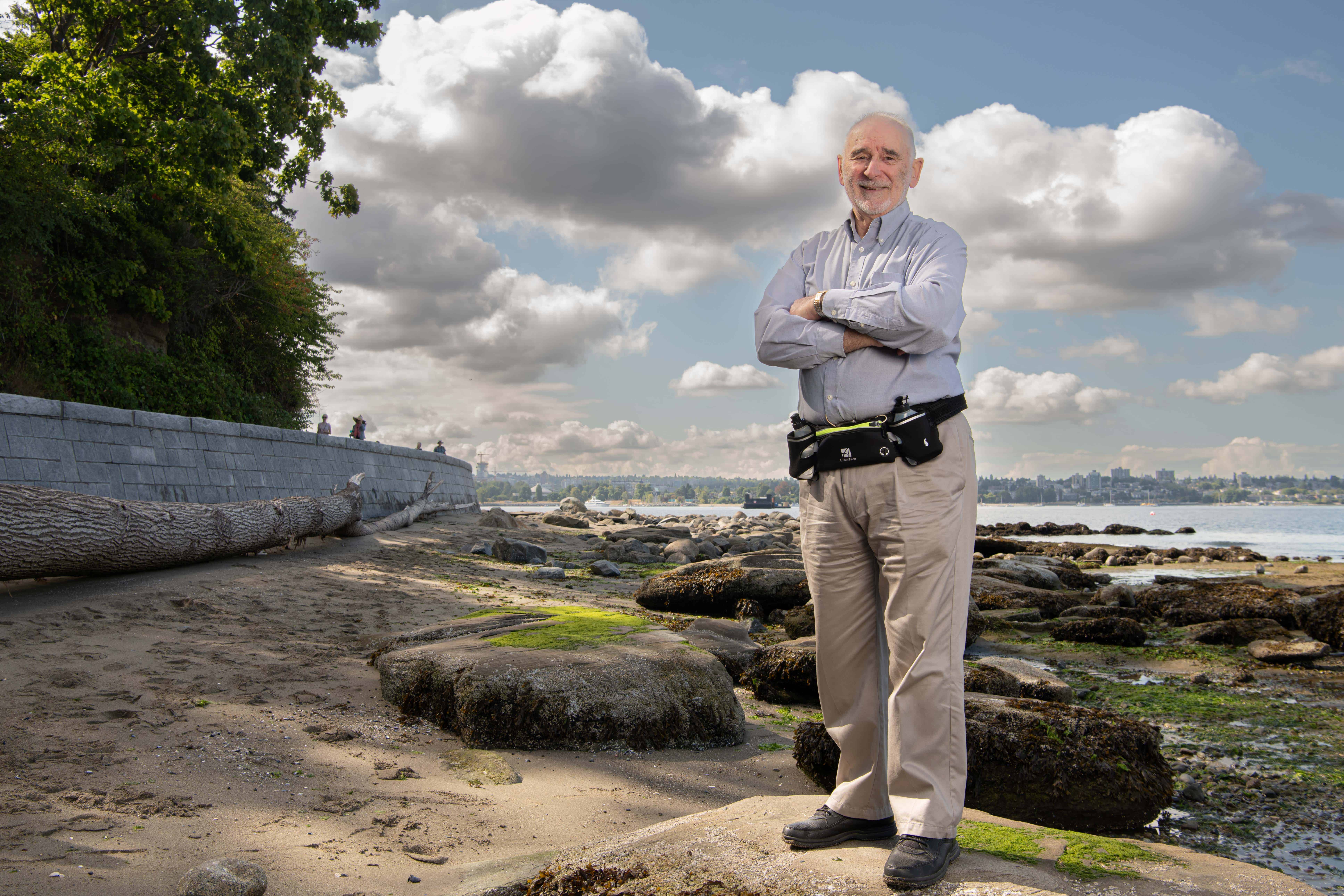When James Stitchman started writing a children’s book with his grandson, he thought he knew how the story would end.
In April 2021, James and his grandson had almost completed their first piece of fiction together, called Thunder and the Werewolves. It was born out of countless stories that the two had created together on their daily drives between school and home.
“The lion’s share of the work had been done already,” says James. All that was left to do was finalize the content.
But like all great tales, the path from start to finish is never easy.
One morning, James’ wife, Kathy, found him in bed with all the lights on. He had developed chills and a fever; he was having trouble speaking; and he didn’t seem to understand what she was saying.
Kathy drove him straight to St. Paul’s Hospital. “I couldn’t go in with him,” Kathy says. “But I really wasn’t worried. I thought they’d check him out and he’d be back home in a few hours.”
That’s not what happened.
The morning after arriving at the hospital, doctors confirmed what Kathy was afraid of. James had COVID, but staff were most concerned about his confusion and slurred speech. They thought he’d had a stroke.
That’s when “the adventure,” as James calls it, really began.
Quick thinking and good timing
Finding themselves at St. Paul’s was a particular shock for James and Kathy, who were both healthy and active.
They lived steps from Vancouver’s seawall: a full 11-kilometre route that James could walk in under two hours. And they were close enough to their grandkids to see them almost every day, often driving them to and from school.
Deep in the pandemic was a scary time to have a loved one in the hospital, unable to visit, to help, or to hold a hand. For Kathy, it was almost unbearable. “The staff did their absolute best to keep me informed, but I know they were run off their feet.” Complicating this was the fact that Kathy had to quarantine due to exposure to COVID.
So she rallied friends and loved ones to help from afar. Family members would come to the front doors of the hospital, hoping to get food, cell phones, toiletries, gifts, and clothing to their loved ones. Staff volunteers, including some from St. Paul’s Foundation, delivered the items.
But upstairs in the hospital, James’ condition was worsening.
A team from the lab arrived for their daily rounds to test and assess COVID patients who might need to move to the ICU. As they got to James, his oxygen levels tanked and his delirium spiked.
Because they were literally at his bedside when it happened, they were able to give him the oxygen treatment and steroids immediately.
“That kept me out of intensive care because they were there so quickly to take care of what they saw was happening,” says James.
“The timing of it was incredible,” Kathy says, her voice catching. “They saved his life.”
Two life-threatening infections at the same time
They didn’t know it yet, but in addition to COVID, James had developed sepsis: an aggressive, systemic infection that kills more people worldwide than cancer or heart disease. If it’s not diagnosed and treated promptly, it can quickly lead to septic shock, multiple organ failure, and death.
“When I did find out that sepsis was the culprit and how deadly it can be, I thought, ‘Wow, I really dodged a bullet here, thanks to the people at St. Paul’s.”
James Stitchman, grateful patient and sepsis survivor
In the coming months, research by the team in the sepsis lab at St. Paul’s would help to prove that up to 85% of patients who become critically ill with COVID will develop sepsis. That would lead the team to another chilling discovery: everyone who died with COVID actually died from sepsis.
For James, the timing of the situation can’t be overstated. If they had come earlier, the red flags might not have been present. If they had come later, it might have been too late.
“I was definitely one of the lucky campers,” quips James.
Writing a new chapter
When he was finally discharged after spending nine days at St. Paul’s, James was ready to make up for lost time.
Within a month, he had reconnected with his publisher, working quickly to order copies of Thunder and the Werewolves and begin sharing their hard work with the world. The moral of the story: When we work together, we can face and overcome almost any danger.
The response was incredible. “In the first three months, it was one of FriesenPress’ bestsellers,” James shares.
But perhaps even more meaningful was the reaction from his granddaughter.
“When my granddaughter saw the book, she said, ‘Papa, what about me?’ So, she ended up writing a book with me that’s been published called Thunder and the Grizzly Bear Cub,” he says.
The Stitchmans now have two published authors in their family under the age of 14, and both of their books are available in the Vancouver Public Library.
“It’s the encouragement from the grandkids that helped get me through the long COVID and get my mind working again,” adds James.
And just three months after surviving sepsis, James was back to his 11-kilometre route around the seawall – clocking in at one hour and 50 minutes.

Angels among us
Kathy is especially grateful for the support of the nurses at St. Paul’s. “Every day I would call the nurses, and they were so good to take the time out to talk to me when they were so, so busy with who knows how much work they had to do because of the pandemic. I am so thankful for everything they did for James.”
James pauses to remember one nurse whom he calls his “guardian angel.”
“All of the medical staff were absolutely first-rate. But this one fellow, he was always there. Any time I had a question or even when I didn’t have a question, I would wake up and realize there was somebody standing beside the bed, and it would be Luke. And he would want to know, ‘Is everything okay? How are you feeling?’”
This time, James’s voice catches. “I don’t know where he parks his harp and his wings, but he’s a true angel. A true caregiver.”
The science of saving lives
The sepsis lab at St. Paul’s is a global research powerhouse. For 35 years it has been home to Dr. Keith Walley and Dr. Jim Russell, both of whom are top-ranked sepsis researchers globally.
At the time of James’ illness, the link between COVID and sepsis was unclear. Today, it is well-documented thanks to Drs. Russell and Walley who were among the first to prove the connection.
“The lethal part of the pandemic wasn’t COVID,” says Dr. Russell. “It was sepsis. Everybody who dies of COVID actually dies of sepsis and pneumonia. Everybody.”
With this life-saving discovery, the team developed rigorous new protocols to assess patients quickly and frequently and ensure they received the most effective treatments available.
Thanks to your support, the amazing team in our sepsis lab is improving survival rates for patients in B.C. and across the globe.
Continuing the work of our guardian angels
The tireless efforts of the doctors, nurses, and allied health professionals at St. Paul’s who saved James’ life wouldn’t exist without you.
When you give to St. Paul’s Foundation, you bring compassion to patients and families during their most vulnerable moments. You help give patients like James the chance to beat the odds. You help support innovative research that saves and improves lives.
